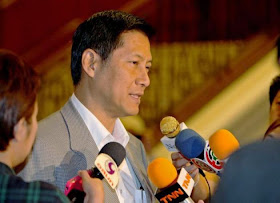 The Thai army says that it is imposing martial law amid a political crisis “to preserve law and order”. The surprise announcement also granted the army wide-ranging powers to enforce its decision.
The Thai army says that it is imposing martial law amid a political crisis “to preserve law and order”. The surprise announcement also granted the army wide-ranging powers to enforce its decision.  The military insisted that its assumption of responsibility for national security was not a coup. Martial law comes after a long-running political crisis, and months
of escalating tensions between the government and the opposition.
The military insisted that its assumption of responsibility for national security was not a coup. Martial law comes after a long-running political crisis, and months
of escalating tensions between the government and the opposition.
The chief security advisor to the interim prime minister Lt, General Paradorn Pattanatabut(photo) said the government had not been consulted about the army’s decision.
Everything is normal except the military is responsible for all national security issues, said Paradorn Pattanatabut.
An army spokesman said that the imposition of martial law will have
no impact on the caretaker government which remains in office.
 The BBC’s Jonathan Head in Bangkok says that the army’s move – which
it says is to stop “ill-intentioned groups from using war weapons” – has
come as a surprise.
The BBC’s Jonathan Head in Bangkok says that the army’s move – which
it says is to stop “ill-intentioned groups from using war weapons” – has
come as a surprise.
Our correspondent says that the army has made it clear that it is in
charge of security and the site of troops on the streets is now likely
to be much more commonplace.
Troops have taken steps to stop pro-government red-shirt supporters
from gathering at their usual rallying-place outside Bangkok.
- The Thai military last took power in 2006.
- Earlier this month a court ordered Prime Minister Yingluck Shinawatra and several cabinet ministers to step down.
- Soldiers have taken over television stations.
- An announcement on military-run television said that martial law had been imposed “to restore peace and order for people from all sides”.
- “The public do not need to panic but can still live their lives as normal,” the announcement said.
- Thailand is mired in political mayhem, with the opposition demanding that power be handed over to an unelected administration charged with rewriting the constitution.
 The military statement was signed by army chief Prayuth Chan-Ocha,
citing a 1914 law that allows it to intervene during times of crisis.
The military statement was signed by army chief Prayuth Chan-Ocha,
citing a 1914 law that allows it to intervene during times of crisis.
It said that the move had been taken because mass rallies between
political rivals “could impact the country’s security and safety of the
lives and properties of the public”.
On Monday acting Prime Minister Niwatthamrong Boonsongphaisan
insisted his government would not resign.
Source: BBC


No comments:
Post a Comment